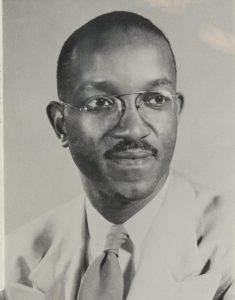 John Hope Franklin was the James B. Duke Professor Emeritus of History, and for seven years was Professor of Legal History in the Law School at Duke University. He was a native of Oklahoma and a graduate of Fisk University (1931-34). He received the A.M. and Ph.D. degrees in history from Harvard University (1934-1941). In 1940, Franklin married his college sweetheart, Aurelia Whittington. The two were married for fifty-nine years until her death in 1999.
John Hope Franklin was the James B. Duke Professor Emeritus of History, and for seven years was Professor of Legal History in the Law School at Duke University. He was a native of Oklahoma and a graduate of Fisk University (1931-34). He received the A.M. and Ph.D. degrees in history from Harvard University (1934-1941). In 1940, Franklin married his college sweetheart, Aurelia Whittington. The two were married for fifty-nine years until her death in 1999.
Franklin taught at a number of institutions, including Fisk University, St. Augustine’s College (1939-1943), North Carolina Central University (1943-1947), and Howard University (1947-1956). In 1956 he went to Brooklyn College as Chairman of the Department of History; and in 1964, he joined the faculty of the University of Chicago, serving as Chairman of the Department of History from 1967 to 1970. At Chicago, he was the John Matthews Manly Distinguished Service Professor from 1969 to 1982, when he became Professor Emeritus. In 1982 he became James B. Duke Professor of History at Duke University, and later joined the faculty of the Duke University School of Law in 1985.
Professor Franklin’s numerous publications include The Emancipation Proclamation, The Militant South, The Free Negro in North Carolina, Reconstruction After the Civil War, and A Southern Odyssey: Travelers in the Ante-bellum North, and Mirror to America: The Autobiography of John Hope Franklin. Perhaps his best known book is From Slavery to Freedom: A History of African-Americans, now in its tenth edition. His Jefferson Lecture in the Humanities for 1976 was published in 1985 and received the Clarence L. Holte Literary Prize for that year. In 1990, a collection of essays covering a teaching and writing career of fifty years, was published under the title, Race and History: Selected Essays, 1938-1988. In 1993, he published The Color Line: Legacy for the Twenty-first Century. Professor Franklin’s book, My Life and an Era: The Autobiography of Buck Colbert Franklin, is an autobiography of his father that he edited with his son, John Whittington Franklin. His research at the time of his death dealt with “Dissidents on the Plantation: Runaway Slaves.”
Professor Franklin was active in numerous professional and education organizations. For many years he served on the editorial board of the Journal of Negro History. He also served as President of the following organizations: The American Studies Association (1967), the Southern Historical Association (1970), the United Chapters of Phi Beta Kappa (1973-76), the Organization of American Historians (1975), and the American Historical Association (1979). He has been a member of the Board of Trustees of Fisk University, the Chicago Public Library, and the Chicago Symphony Orchestra Association.
Professor Franklin served on many national commissions and delegations, including the National Council on the Humanities, from which he resigned in 1979, when the President appointed him to the Advisory Commission on Public Diplomacy. He also served on the President’s Advisory Commission on Ambassadorial Appointments. In September and October of 1980, he was a United States delegate to the 21st General Conference of UNESCO. Among many other foreign assignments, Dr. Franklin served as Pitt Professor of American History and Institutions at Cambridge University, Consultant on American Education in the Soviet Union, Fulbright Professor in Australia, and Lecturer in American History in the People’ Republic of China. In 1997 he chaired the One America in the 21st Century: The President’s Initiative on Race under President Bill Clinton.
Professor Franklin was the recipient of many honors. In 1978, Who’s Who in America selected Dr. Franklin as one of eight Americans who has made significant contributions to society. In the same year, he was elected to the Oklahoma Hall of Fame. He also received the Jefferson Medal for 1984, awarded by the Council for the Advancement and Support of Education. In 1989, he was the first recipient of the Cleanth Brooks Medal of the Fellowship of Southern Writers, and in 1990 received the Encyclopedia Britannica Gold Medal for the Dissemination of Knowledge. In 1993, Dr. Franklin received the Charles Frankel Prize for contributions to the humanities, and in 1994, the Cosmos Club Award and the Trumpet Award from Turner Broadcasting Corporation. In 1995, he received the first W.E.B. DuBois Award from the Fisk University Alumni Association, the Organization of American Historians’ Award for Outstanding Achievement, the Alpha Phi Alpha Award of Merit, the NAACP’s Spingarn Medal, and the Presidential Medal of Freedom. In 1996, Professor Franklin was elected to the Oklahoma Historians Hall of Frame and in 1997 he received the Peggy V. Helmerich Distinguished Author Award. In addition to his many awards, Dr. Franklin has received honorary degrees from more than one hundred colleges and universities.
Professor Franklin died on March 25th, 2009.
